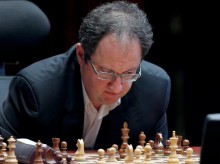Despite loss, Israeli chess grandmaster wins fans
 Boris Gelfand contemplates his next move against World Chess champion Viswanathan Anand. (AP Photo/Misha Japaridze)
Boris Gelfand contemplates his next move against World Chess champion Viswanathan Anand. (AP Photo/Misha Japaridze)
JERUSALEM (AP) — Israel’s latest cultural hero is neither the usual army general nor a sexy celebrity — he’s a bespectacled 43-year-old Belarus-born chess grandmaster.
Israelis have been riveted by Boris Gelfand’s three-week battle for world chess supremacy. Despite coming up just short this week, losing in a sudden-death round, his efforts have attracted new fans and drawn attention to Israel as a surprising chess powerhouse.
His duel with world chess champion Viswanathan Anand of India was broadcast live on Israeli TV, thousands joined Gelfand fan pages on Facebook and his moves became water cooler talk in Israel — even among those who can’t tell the difference between a rook and a bishop.
Anand retained his title in Moscow on Wednesday, beating Gelfand 2.5-1.5 in a rapid tiebreaker round — the chess equivalent of a penalty shootout — after the two tied at 6-6 after 12 regular games.
Gelfand came one point short of claiming a title once held by the likes of chess greats Boris Spassky, Bobby Fischer and Garry Kasparov.
The Russian-speaking Gelfand was supported by Russian fans throughout the match as if he were a home player.
In Israel, “Gelfand-mania” was already in full steam by then. So many people logged on to watch him that the Israel Chess Federation said its website crashed.
Even in defeat, Gelfand made the front pages of Israeli newspapers, topped the evening newscasts and fielded congratulatory phone calls from Israeli President Shimon Peres and Prime Minister Benjamin Netanyahu.
“I followed your moves and I was impressed. When you were thinking, I thought about what you were thinking,” Netanyahu, who plays some chess himself, told him. “You created great interest among many people about chess thanks to your example.”
In his post-match interview, Gelfand said he hoped his performance will boost interest to chess among Israelis.
Despite limited interest among the native-born, Israel has surged to become a top five chess nation, thanks mostly to a large influx of Soviet immigrants. Israel has some 50 grandmasters and has earned medals in the past two Chess Olympiads, said Almog Burstein, the executive director of the Israel Chess Federation.
“Gelfand is the deputy world champion and rightfully so. He brought the country great honor,” said Burstein, the chess official. “Gelfand may have lost, but chess in Israel won.”
He said some 3,000 Israelis play in leagues, and dozens have won international tournaments. He said the achievements were reached without generous government support.
“With more investment, Israel won’t just be in the top five in the world, it will be number one,” he said.
One of the main backers of chess in Israel is Natan Sharansky, the former Soviet Jewish dissident who spent more than a decade in prison. A child chess prodigy, Sharansky said he kept his sanity while in solitary confinement at a Siberian prison camp by playing chess against himself in his mind.
Later, as a Cabinet minister in 1998, he helped Gelfand immigrate from Belarus to help boost the local chess scene.
“When he arrived he was 30, and we thought that was the height of his career, but for the past 13 years he has just been getting better and better,” said Sharansky, who now heads the quasi-governmental Jewish Agency, which helps Jews immigrate to Israel.
Sharansky, who has played — and drawn — Gelfand twice, said Netanyahu called him several times during the tournament to discuss the grandmaster’s maneuvers.
 Contact aron
Contact aron RSS SUBSCRIBE
RSS SUBSCRIBE ALERT
ALERT